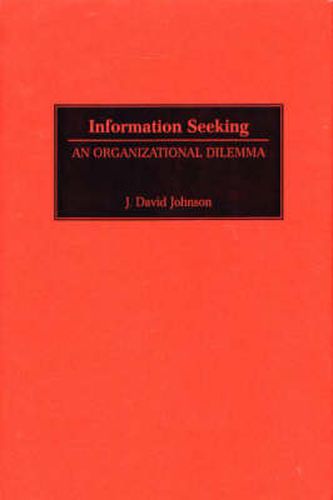Readings Newsletter
Become a Readings Member to make your shopping experience even easier.
Sign in or sign up for free!
You’re not far away from qualifying for FREE standard shipping within Australia
You’ve qualified for FREE standard shipping within Australia
The cart is loading…






How do people in organizations get the information they need to do their work, and what are the effects of their research -positive and negative-on their organizations? Indeed, says the author of this unique, provocative study, the forces that promote ignorance within organizations often outweigh the drive to obtain knowledge. Johnson explores both sides of the information-seeking dilemma, the reasons why people do and do not look for and get the information they need-and why the multi-billion-dollar technologies that have been developed to facilitate information gathering so often fail. Research-based, with a model to explain how information seeking works in organizations, Dr. Johnson’s book will be fascinating, essential reading not only for gatherers of information in all types of organizations, but for the purveyors, their technological support staffs.
The study of information seeking is one of great pragmatic importance for individuals, organizations, and our society. It is also one that is more complex than it might at first appear, presenting many dilemmas for the organization. Chapter 1 provides a basic overview of the importance of information seeking and a definition. Chapter 2 describes the more general communication structure of organizations in which individual information seeking is embedded. While traditional views of structure were based on the need to restrict information access in order to reduce information load, more modern views try to capture how organizations can process ever larger volumes of information. Chapter 3 describes the information fields outside of the organization. Chapter 4 develops a more complete picture of the information carriers that individuals have to select from. Chapter 5 describes the barriers to information seeking which often result from the real benefits of ignorance for both individuals and organizations. Chapter 6 details strategies individuals can use in their search for information. Chapter 7 discusses what management can do to facilitate a seeker’s search for information. In summary, Chapter 8 weaves all of the themes of the book together in discussing the importance of the development of a theory of information seeking and the pragmatic implications of information seeking for our society as a whole.
$9.00 standard shipping within Australia
FREE standard shipping within Australia for orders over $100.00
Express & International shipping calculated at checkout
How do people in organizations get the information they need to do their work, and what are the effects of their research -positive and negative-on their organizations? Indeed, says the author of this unique, provocative study, the forces that promote ignorance within organizations often outweigh the drive to obtain knowledge. Johnson explores both sides of the information-seeking dilemma, the reasons why people do and do not look for and get the information they need-and why the multi-billion-dollar technologies that have been developed to facilitate information gathering so often fail. Research-based, with a model to explain how information seeking works in organizations, Dr. Johnson’s book will be fascinating, essential reading not only for gatherers of information in all types of organizations, but for the purveyors, their technological support staffs.
The study of information seeking is one of great pragmatic importance for individuals, organizations, and our society. It is also one that is more complex than it might at first appear, presenting many dilemmas for the organization. Chapter 1 provides a basic overview of the importance of information seeking and a definition. Chapter 2 describes the more general communication structure of organizations in which individual information seeking is embedded. While traditional views of structure were based on the need to restrict information access in order to reduce information load, more modern views try to capture how organizations can process ever larger volumes of information. Chapter 3 describes the information fields outside of the organization. Chapter 4 develops a more complete picture of the information carriers that individuals have to select from. Chapter 5 describes the barriers to information seeking which often result from the real benefits of ignorance for both individuals and organizations. Chapter 6 details strategies individuals can use in their search for information. Chapter 7 discusses what management can do to facilitate a seeker’s search for information. In summary, Chapter 8 weaves all of the themes of the book together in discussing the importance of the development of a theory of information seeking and the pragmatic implications of information seeking for our society as a whole.